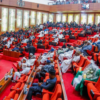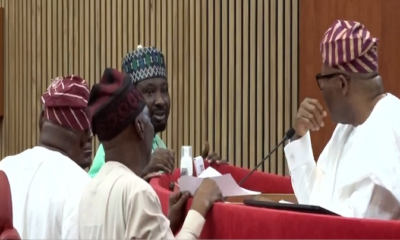Local News
NAF Deploys Additional Air Assets to Benue to Strengthen Peace and Security in Nigeria’s Middle Belt
NAF deploys air assets to bolster security in Benue, providing precision strikes, surveillance, and close air support missions.
The Nigerian Air Force (NAF) on Tuesday said it has deployed additional air assets to the Air Component of Joint Task Force North-Central, Operation Whirl Stroke (OPWS), as part of its sustained efforts to restore peace and stability across the North Central region, particularly in Benue State.
The Service also stressed that this strategic move reinforces its commitment to enhancing security, supporting ground operations, and reassuring communities affected by banditry, kidnapping, and communal unrest.
The Director of Public Relations and Information, Headquarters, Nigerian Air Force, Air Commodore Ehimen Ejodame, in a statement said that to assess the effectiveness of these expanded efforts, the Chief of the Air Staff (CAS), Air Marshal Hasan Bala Abubakar, conducted a firsthand evaluation of air operations under OPWS.
He said that the visit included a high-level strategic engagement at the Headquarters Tactical Air Command, Makurdi.
“Present at the meeting were the Chief of Army Staff, Lieutenant General Olufemi Oluyede; a representative of the Chief of Naval Staff, Rear Admiral Olusegun Ferreira; the Commander of OPWS; and the Maritime and Air Component Commanders, alongside other key stakeholders. Critical updates were provided on the current of joint operations aimed at restoring lasting peace across the region,” he revealed.
The CAS further revealed that the newly deployed air assets have been successfully integrated into ongoing operations, delivering real-time intelligence and precision targeting support.
NAF aircraft, he said have continued to conduct surveillance, armed reconnaissance, close air support, and precision strike missions with remarkable success.
The Air Chief noted that the current deployment aligns with the Federal Government’s overarching mission to stabilise the Middle Belt region.
He highlighted the impact of recent coordinated air and ground operations across Benue, Nasarawa, and Taraba States, which have led to the dismantling of several militia camps, bandit enclaves, and criminal hideouts.
He said, “These outcomes reinforce our unwavering commitment to protecting innocent lives and supporting national peace-building initiatives. As long as peace is threatened, our resolve remains unshaken. The Nigerian Air Force will continue to deliver timely, decisive air support in synergy with sister services, ensuring the protection of lives and properties while advancing our mission of restoring peace to the Middle Belt and beyond.”
The Service Chiefs jointly emphasized the importance of synergy among the Armed Forces and other security agencies, noting that jointness remains a cornerstone for operational success under Operation Whirl Stroke.
They reiterated that the ongoing operations are part of a broader goal to create a secure environment where residents can live and conduct their legitimate activities without fear.
Also, the Nigerian military has denied any involvement in the massacre in Benue State.
The Chief of Defence Staff, General Christopher Musa, publicly stated that the military was not responsible for the killings in Yelwata.
The Acting Director Defence Information, Brigadier General Tukur Gusau, in a statement emphasized the military’s commitment to protecting civilians and upholding the rule of law.
He said, “There is no credible evidence to substantiate claims of internal sabotage within the military relating to the Yelwata incident.”
The military also highlighted that the violence in Yelwata is part of a broader pattern of inter-communal clashes in Nigeria’s Middle Belt region, driven by longstanding disputes over land and grazing rights, ethnic tensions, and competition for resources.
He stressed that attributing the Yelwata massacre to internal sabotage within the Nigerian military is misleading and detracts from the real issues at play.
The CDS called for a holistic approach and the need for communities and security agencies to work together to address the issue.
He also called on communities not to hide criminals and assured them that the military and other security agencies are there to protect lives and properties of law-abiding citizens.





















